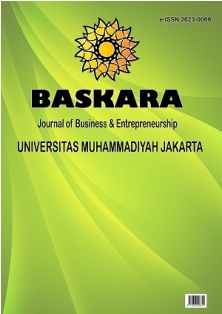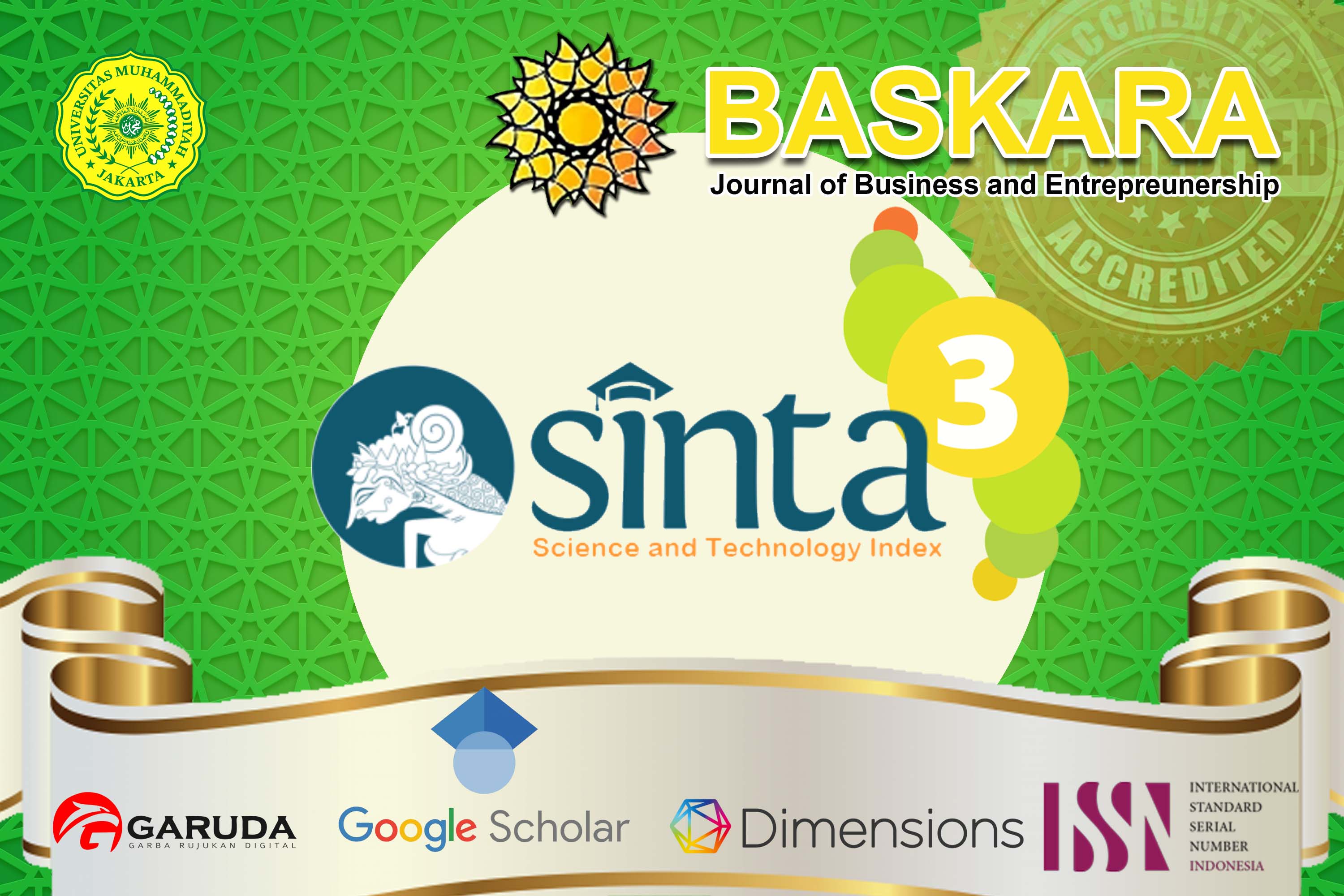Impact of Event Indonesia Fashion Week to Wardah's Brand
DOI:
https://doi.org/10.54268/baskara.v3i1.7436Kata Kunci:
Public Relations, Event Management, Brand ImageAbstrak
Indonesia Fashion Week Event (IFW) is a movement in the fashion sector initiated by the Indonesian Fashion Designers Association (APPMI). This movement aims to make Indonesia as one of the world's fashion centres. This event held regularly every year since 2010. This event is Wardah's event as one of the famous cosmetic brands to increase awareness. This study aims to measure how much influence the Indonesia Fashion Week (IFW) Event on Wardah's Image is in the Jabodetabek Hijabers Community. The theory used in this study is the theory of public relations, the theory of events and the theory of image. This study uses a quantitative approach to analytical methods. This method is to examine the influence between Variables (X) and Variables (Y). Data collection techniques using questionnaires distributed in Hijabers Community using accidental sampling techniques. From the results of research and discussion, it can see that the dimensions of Perishability at the Indonesia Fashion Week event have the lowest average value among the four other variables 73.6%. Which means that the Indonesia Fashion Week event schedule does not have an event schedule must adjust to the target visitors and participant following the theme carried. Besides, the results of the second study that Wardah's Image is in the "Good" category. It proves from the results of the comparison of the results obtained with the achievement value of 82.3%. The results of the third study, the Indonesia Fashion Week 2018 event was able to increase Wardah's image in the Jabodetabek Hijabers Community. Based on the calculation of the Determinant Coefficient, the value of the Indonesia Fashion Week Event is 0.3169 or 31.69%. The Indonesia Fashion Week Event influences Wardah's image at 31.69%, and other variables determine the remaining 68.31%.Referensi
Abdullah, Alan Iqbal. 2009. Manajemen Konfrensi dan Event. Yogyakarta: Gadjah Mada University Press.
Andrianto, Elvinaro. 2011. Handbook of Public Relations Pengantar Komprehensif. Bandung: Simobiosa Rekatama Media.
Basri, H., El Adawiyah, S., & Hernawan, W. (2019). Women and politics. Opcion, 35 (Special Issue 21), 1485-1495.
Bungin, Burhan, 2010. Metodologi Penelitian Kuantitatif. Jakarta: Prenada Media Group.
Cutlip, Center. 2006. Effective Public Relations. Jakarta: Kencana Prenada Media Group.
El Adawiyah, S., Hubeis, A. V. S., Sumarti, T., & Susanto, D. (2019). The role of women in regional leadership as political communicators. Opcion, 35(Special Issue 21), 464-481
El Adawiyah, S., Satispi, E., Basri, H., Tuti, R. W. D., Patrianti, T., & Ramadhan, A. I. (2020). The woman leadership as regional head. Journal of Critical Reviews, 7(7), 556-560. doi:10.31838/jcr.07.07.98
El Adawiyah, S., & Ramadhan, A. I. (2020). Partisipasi Masyarakat Dalam Model Geulis (Gerakan Lingkungan Sehat) Perwujudan Desa Siaga Di Daerah Dramaga Bogor. BASKARA: Journal of Business & Entrepreneurship, 2(2), 93-106.
Husaini, Usman. 2006. Pengantar Statistik. Yogyakarta: Bumi Aksara.
Jefkins, Frank. 2006. Public Relations. Jakarta: Erlangga.
Kusumastuti, Frida. 2001. Dasar-dasar Humas. Bogor: Ghalia Indonesia.
Krisyantono, Rachmat. 2006. Teknik Praktis Riset Komunikasi. Jakarta: Kencana Prenada Media Group.
Natoradjo, Sulyus. 2011. Event Organising Dasar-dasar Event Management. Jakarta: Gramedia Pustaka Utama.
Noor, Any. 2009. Manajemen Event. Bandung: Alfa Beta.
Phillip Kotler P. 2000. Manajemen Pemasaran : Analisis, Perencanaan, Implementasi dan Kontrol. Jakarta: PT Prenhallindo.
Rudiatin, E., & Ramadhan, A. I. (2018). Kekuatan Moral Dan Budaya, Mendukung Perekonomian Indonesia: Sebuah Gambaran Usaha Kecil Dan Menengah. BASKARA Journal of Business & Entrepreneurship, 1(1), 21-34.
Rudini, N., Suradika, A., & Irawati, D. (2017). The study of phenomenology: hemodialysis patients experience in addressing the psychosocial changes. Int J Sci Res, 6(10), 259-267.
Ruslan, Rosady. 1999. Praktik dan Solusi Public Relations Dalam Krisis dan Pemulihan Citra. Jakarta: Ghalia Indonesia.
Soehadi A, 2005. Effective Branding. Yogyakarta: Penerbit Andi.
Sugiyono, 2013. Metode Penelitian Kuantitatif Kualitaitif dan R&D. Bandung: Alfa Beta.
Suradika, Agus. 2000. Metode Penelitian Sosial. Jakarta: UMJ Press.
##submission.downloads##
Diterbitkan
Terbitan
Bagian
Lisensi
In order for Baskara: Journal of Business and Entrepreneurship to publish and disseminate research articles, we need publishing rights (transfered from author(s) to publisher). This is determined by a publishing agreement between the Author(s) and Baskara Journal. This agreement deals with the transfer or license of the copyright of publishing to Baskara: Journal of Business and Entrepreneurship, while Authors still retain significant rights to use and share their own published articles. Baskara : Journal of Business and Entrepreneurship supports the need for authors to share, disseminate and maximize the impact of their research and these rights, in any databases.
As a journal Author, you have rights for a large range of uses of your article, including use by your employing institute or company. These Author rights can be exercised without the need to obtain specific permission. Authors publishing in Baskara : Journal of Business and Entrepreneurship have wide rights to use their works for teaching and scholarly purposes without needing to seek permission, including:
- use for classroom teaching by Author or Author's institution and presentation at a meeting or conference and distributing copies to attendees;
- use for internal training by author's company;
- distribution to colleagues for their reseearch use;
- use in a subsequent compilation of the author's works;
- inclusion in a thesis or dissertation;
- reuse of portions or extracts from the article in other works (with full acknowledgement of final article);
- preparation of derivative works (other than commercial purposes) (with full acknowledgement of final article);
- voluntary posting on open web sites operated by author or author’s institution for scholarly purposes.
Copyright Transfer Agreement for Publishing (Publishing Right)
The Authors who submit manuscript has to understand that if accepted for publication, mean that all copyright and publishing right of the article shall be assigned/transferred to Baskara: Journal of Business and Entrepreneurship as assigned publisher.
- CC BY-NC: This license allows reusers to distribute, remix, adapt, and build upon the material in any medium or format for noncommercial purposes only, and only so long as attribution is given to the creator.
It includes the following elements:
BY ![]() – Credit must be given to the creator
– Credit must be given to the creator
NC ![]() – Only noncommercial uses of the work are permitted
– Only noncommercial uses of the work are permitted
Baskara (C) Copyright (2022):
BASKARA: Journal of Business and Entrepreneurship by https://jurnal.umj.ac.id/index.php/baskara
is licensed under a Creative Commons Attribution-NonCommercial 4.0 International License








